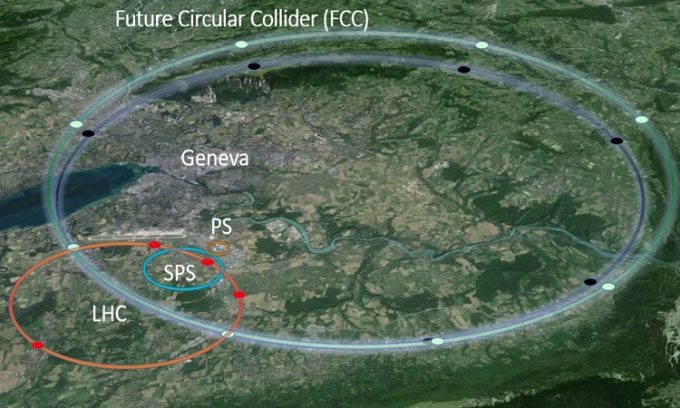The European Organization for Nuclear Research (CERN) is taking the initial steps to construct a new massive particle accelerator aimed at research in medical imaging and cancer treatment.

The size of the FCC particle accelerator compared to the LHC. (Photo: ICMAB).
Future Circular Collider (FCC) will be more than three times longer than the Large Hadron Collider (LHC), the largest and most powerful particle accelerator in the world today, helping to reveal secrets about the mechanisms of the universe. The FCC will be located in a new circular tunnel beneath France and Switzerland, measuring 91 km in length and approximately 5 m in diameter, Phys.org reported on April 22.
According to CERN, the goal of the FCC is to enhance the energy and intensity of the particle accelerator, achieving a collision energy of 100 tera electron volts, equivalent to 10 million lightning strikes. The tunnel will run beneath Geneva, Switzerland, and loop south near the town of Annecy in France. Eight scientific and technical facilities will be constructed on the surface, with seven located in France and one in Geneva, according to engineer Antoine Mayoux of CERN.
After conducting theoretical analyses, Mayoux and colleagues have embarked on their first field activities to study potential environmental issues, followed by seismic and geotechnical studies. Upon completion of the feasibility assessment, the 22 member countries of CERN will decide whether to proceed with the construction of the FCC in the next 5 to 6 years.
The FCC will accelerate electrons and positrons until 2060, followed by hadrons until 2090. The machine will seek to answer many unresolved questions in fundamental physics. About 95% of the mass and energy of the universe remains a mystery. CERN’s Large Hadron Collider (LHC), with a circumference of 27 km located about 100 m underground, was previously used to prove the existence of the Higgs Boson, also known as the God particle, expanding our understanding of how particles acquire mass, which earned two scientists the Nobel Prize in Physics in 2013. The LHC began operations in 2010 and is expected to cease operations around 2040.
Some experts are concerned that this massive project may consume funding that could be used for other, less abstract physics research. However, Malika Meddahi, Deputy Director of Accelerators and Technology at CERN, emphasizes the extremely important benefits of research such as medical imaging and cancer treatment.


















































